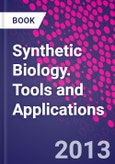Synthetic Biology provides a framework to examine key enabling components in the emerging area of synthetic biology. Chapters contributed by leaders in the field address tools and methodologies developed for engineering biological systems at many levels, including molecular, pathway, network, whole cell, and multi-cell levels. The book highlights exciting practical applications of synthetic biology such as microbial production of biofuels and drugs, artificial cells, synthetic viruses, and artificial photosynthesis. The roles of computers and computational design are discussed, as well as future prospects in the field, including cell-free synthetic biology and engineering synthetic ecosystems.
Synthetic biology is the design and construction of new biological entities, such as enzymes, genetic circuits, and cells, or the redesign of existing biological systems. It builds on the advances in molecular, cell, and systems biology and seeks to transform biology in the same way that synthesis transformed chemistry and integrated circuit design transformed computing. The element that distinguishes synthetic biology from traditional molecular and cellular biology is the focus on the design and construction of core components that can be modeled, understood, and tuned to meet specific performance criteria and the assembly of these smaller parts and devices into larger integrated systems that solve specific biotechnology problems.
Please Note: This is an On Demand product, delivery may take up to 11 working days after payment has been received.
Table of Contents
Introduction Section I. Synthesis and engineering tools in synthetic biology 1. DNA synthesis 2. Protein engineering 3. Pathway engineering 4. Biological standardization
Section II. Computational and theoretical tools in synthetic biology 5. Biocomplexity issues in synthetic biology 6. Computational protein design 7. Computer-Aided Design in Synthetic Biology 8. Computational tools for strain design
Sections III. Applications in synthetic biology 9. Pathway/network level: design and applications of therapeutic genetic circuits 10. Pathway/network level: production of drugs 11. Pathway/network level: synthesis of new fuels 12. Organism level: genome assembly 13. Multi-cell level: synthetic prey-predator system
Section IV. Future prospects 14. Design of artificial cells 15. Cell-free synthetic biology 16. Artificial photosynthesis 17. Engineering synthetic ecosystems
Authors
Huimin Zhao University of Illinois at Urbana-Champaign, Urbana, IL, USA.Dr. Huimin Zhao is the Centennial Endowed Chair Professor of chemical and biomolecular engineering, and professor of chemistry, biochemistry, biophysics, and bioengineering at the University of Illinois at Urbana-Champaign (UIUC). He received his B.S. degree in Biology from the University of Science and Technology of China in 1992 and his Ph.D. degree in Chemistry from the California Institute of Technology in 1998 under the guidance of Dr. Frances Arnold. Prior to joining UIUC in 2000, he was a project leader at the Industrial Biotechnology Laboratory of the Dow Chemical Company. He was promoted to full professor in 2008. Dr. Zhao has authored and co-authored 150 research articles and 20 issued and pending patent applications with several being licensed by industry. In addition, he has given plenary, keynote or invited lectures in more than 170 international meetings and institutions. Eight of his former graduate students and postdocs became professors in the US and other countries.
Dr. Zhao received numerous research and teaching awards and honors, including Guggenheim Fellowship (2012), Fellow of the American Association for the Advancement of Science (AAAS) (2010), Fellow of the American Institute of Medical and Biological Engineering (AIMBE) (2009), American Institute of Chemical Engineers (AIChE) Food, Pharmaceutical, and Bioengineering Division Plenary Award Lecturer (2009), the American Chemical Society (ACS) Division of Biochemical Technology Young Investigator Award (2008), Outstanding Overseas Young Chinese Scholars Award (2007), DuPont Young Professor Award (2005), National Science Foundation CAREER Award (2004), Dow Chemical Special Recognition Award (1999), Xerox Award for Faculty Research from UIUC College of Engineering (2005), Petit Scholar from UIUC College of Liberal Arts and Sciences (2006), and University Scholar from UIUC (2007). Dr. Zhao served as a consultant for over 10 companies such as Pfizer, Maxygen, BP, Gevo, and zuChem, and a Scientific Advisory Board member of Gevo and Myriant Technologies. He is also an advisor to the Department of Energy's Biological and Environmental Research program. Dr. Zhao is an Associate Editor of ACS Catalysis and an editor of ACS Synthetic Biology, Journal of Industrial Microbiology and Biotechnology, and Scientific Reports (Nature). His primary research interests are in the development and applications of synthetic biology tools to address society's most daunting challenges in human health and energy, and in the fundamental aspects of enzyme catalysis, cell metabolism, and gene regulation.








